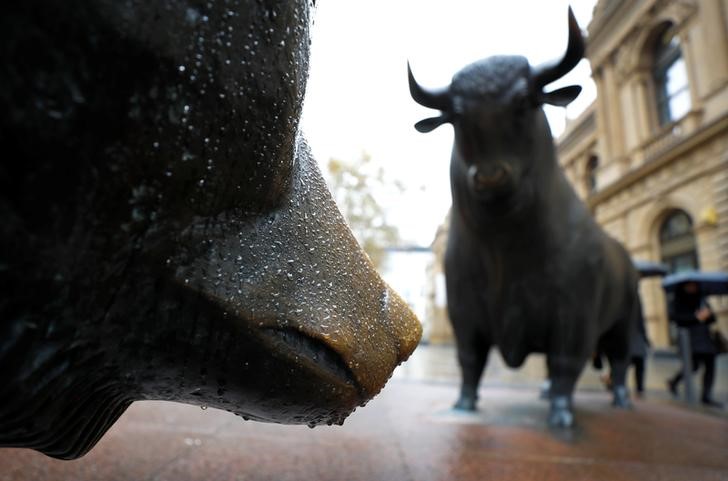This post was originally published on this site
https://i-invdn-com.investing.com/news/LYNXMPEE3B0E7_M.jpg
At 03:40 ET (07:40 GMT), the DAX index in Germany traded 0.1% higher, the FTSE 100 in the U.K. rose 0.1% and the CAC 40 in France climbed 0.1%.
Yet, these major cash indices are all on course to register losses this week, while the pan-European benchmark STOXX 600 index has fallen for seven straight days, its worst string of losses since February 2018.
Data released earlier Friday showed that French industrial output rebounded more than expected in July, climbing 0.8% on a monthly basis instead of the 0.1% expected after slumping 0.9% the prior month.
The equivalent data in Spain fell 1.8% in July, but this was still better than the 2.0% fall expected and the prior month’s 3.2% drop.
While these figures have generated some optimism, industrial production in Germany, the region’s dominant economy, fell by more than expected in July
Gross domestic product in the eurozone grew just 0.1% in the second quarter compared to the previous three months, and Citigroup (NYSE:C) has downgraded its 2023 economic growth forecast for the euro area to 0.4%, and said it expected the region’s economy to shrink “gently” over the next three quarters.
Additionally, German consumer prices rose 0.3% on the month in August, an annual rise of 6.1%, data showed earlier Friday.
This represented a minor slowing from the 6.2% annual increase the previous month, which could pressure ECB policymakers to hike interest rates once more next week given inflation in the eurozone’s largest economy remains more than three times higher than the central bank’s medium-term 2% target.
The European Central Bank has raised rates at each of its past nine meetings and policymakers are now debating whether to raise the deposit rate again, to 4%, or pause.
It’s not only Europe that is struggling economically.
A string of weak economic readings this week have increased concerns about the strength of the recovery of the Chinese economy from its COVID hit, while Friday’s revised data showed Japan’s economy grew less than initially estimated in the second quarter.
Japan’s economy grew an annualised 4.8% in April-June, down from a preliminary estimate of 6.0% growth and below market forecasts for a revised 5.5% expansion.
The tech sector is likely to remain in the spotlight Friday as a consequence of Apple’s difficulties in China.
Apple (NASDAQ:AAPL) has seen about $200 billion wiped from its market capitalisation in two days on reports of China curbing iPhone use by state employees.
This comes ahead of an event next week where the world’s most valuable company is expected to unveil its iPhone 15 line-up.
Elsewhere, Casino (EPA:CASP) stock fell 1.6% after Euronext said the debt-ridden supermarket retailer will be excluded from a key French equity index of major companies.
Oil prices retreated Friday, falling further from the 10-month peaks seen earlier in the week on concerns about the health of the crucial Chinese economy and weighed by a strong dollar.
Yet, despite these losses, both benchmarks are still on course for gains of around 1% this week on the back of the news that top producers Saudi Arabia and Russia have extended their voluntary supply cuts to the end of the year.
Additionally, data released late Thursday showed that U.S. inventories shrank a hefty 6.3 million barrels in the week to September 1, falling for the fourth consecutive week.
By 03:40 ET, the U.S. crude futures traded 0.4% lower at $86.56 a barrel, while the Brent contract dropped 0.2% to $89.78.
Additionally, gold futures rose 0.3% to $1.948.75/oz, while EUR/USD traded 0.1% higher at 1.0713.

